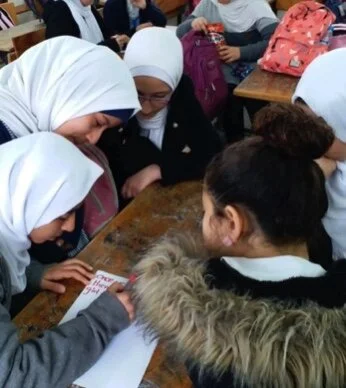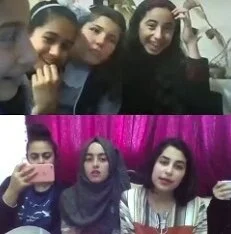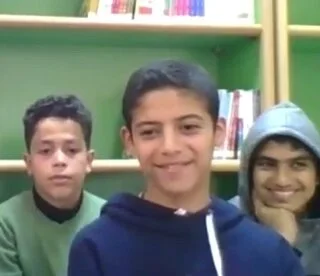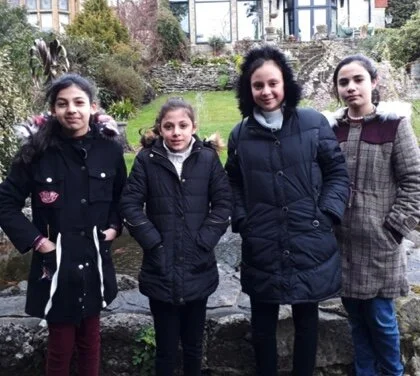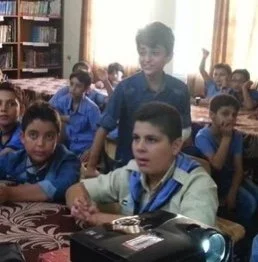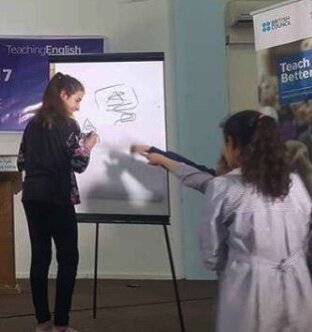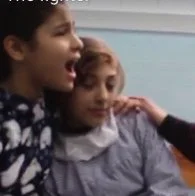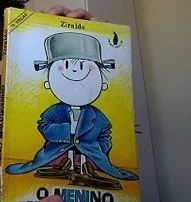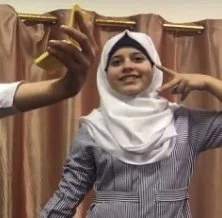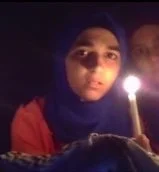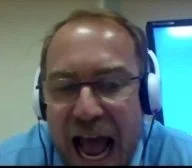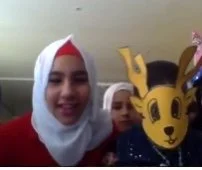Last year, thanks to generous support from the Eddie Byers fund, Greenall Florent Books, Wendy Arnold and Walter King, I was able to go to Palestine on several occasions and run some short courses for UNRWA and Ministry of Education teachers on establishing and running English drama clubs in Palestinian schools.
Read MoreMy talks in 2017 and 2108 at the annual IATEFL conference in the UK included live remote plays performed through Zoom by children in Palestine. This year we did something different.
Read MoreThis week a post, and a great idea for helping young people write poetry, from one of our long term Hands Up Project volunteers based in Spain, Sara Wood.
Read MoreIn English classes in Gaza people sometimes ask " If you were in Britain, what would you do?" They do this as a way to practise the second conditional which as you know is used for talking about unreal, hypothetical situations. One day in January this year I suddenly realised that for us this situation wasn't hypothetical any more. I was chasing something possible; the long – awaited dream was going to come true. The unforgettable journey started when the HUP announced the winner of the Remote Theatre Competitions 2019.
Read MoreAs a writer of English language teaching materials, I like it when a teacher comes up to me at a conference and tells me that they've tried out an activity in one of my books and that it worked really well. It's particularly fulfilling when I discover that actually they've adapted the activity quite a bit to suit their own teaching context, as this means that they haven't just blindly followed the instructions but have really taken it to heart.
Read MoreI've collated and condensed some of the many comments from the judges to create a short paragraph about all the winning plays. We very much look forward to awarding all of these plays their trophies, and to seeing their live performances in the West Bank over the next year.
Read MoreAs a writer of English language teaching materials, I like it when a teacher comes up to me at a conference and tells me that they've tried out an activity in one of my books and that it worked really well. It's particularly fulfilling when I discover that actually they've adapted the activity quite a bit to suit their own teaching context, as this means that they haven't just blindly followed the instructions but have really taken it to heart.
Read MoreI've just returned from a very fulfilling 10 day trip to Gaza and the West Bank. There were so many highlights to this trip for me. I am so proud to be able to witness the creative drama work which is being produced by Palestinian young people and teachers.
Read MoreAt the IATEFL conference in Brighton last week, and again at the Hands Up Project conference at Westminster University which immediately followed it, Rida Thabet and I gave a talk about the special type of drama that The Hands Up Project is enabling Palestinian and Syrian children to perform through Zoom to audiences around the world. We have termed this form of drama Remote Theatre.
Read MoreAt the IATEFL conference in Brighton last week, and again at the Hands Up Project conference at Westminster University which immediately followed it, Rida Thabet and I gave a talk about the special type of drama that The Hands Up Project is enabling Palestinian and Syrian children to perform through Zoom to audiences around the world. We have termed this form of drama Remote Theatre.
Read MoreOne of the things that I find most moving about the work of the Hands Up Project is the relationship that develops between the remote teacher and the classroom teacher. Alex Guzik in Russia and Sahar Salha in Gaza have been working together for well over two years now, planning online sessions together, feeding back to each other after the online session has taken place - even negotiating together what will happen next while the session is going on.
Read MoreIn many language classrooms around the world teachers generally ask a lot of questions to students. They do this as a way to generate chat and discussion, as in 'Did you have a nice trip?' or 'What do you think Jbene should do now?', but they also do it to test the knowledge of the students, as in "What's the past of go? ' and 'How do we say سمك in English?'Recently, in my online sessions with groups of kids in Palestine, I've been experimenting with a technique that encourages the learners to ask the questions.
Read MoreWe are excited to inform you that Saturday the 14th April will be the Hands Up Project conference at Westminster University in Central London. As you'll see below there is a fantastic line up of speakers and the climax will be a live performance by the winners of our playmaking competition - 'Inner Thoughts' from Khan Younis, Gaza.
Read MoreThe Hands Up Project isn't really very good at 'teaching' language. After three years of running this project, I've come to the conclusion that with all the power cuts, the often weak internet connection and the lack of physical presence, working online like this is actually quite an ineffective way of teaching anybody anything at all.
Read MoreOrganising a play writing competition is a good way to motivate learners of English, but drama as a tool for learning has more depth, is more holistic, and is much more wide-reaching than an approach which only emphasises the achievements of the few groups that win.In this post I want to focus on the process based drama work of two Gazan UNRWA English teachers, Sahar Salha and Saida Almadhoon who, each in their own way, have incorporated drama into their English curriculums by turning the playmaking competition into a drama project.
Read MoreThere is something very beautiful that's been going on between Brazil and Palestine.It all started last summer when I was sponsored by Cambridge University Press to go to Brazil to do a series of talks all over the country. I was talking about the use of images in language learning and, since images are such an integral part in the way we work, I mentioned the Hands Up Project a lot. The talks went down well but the Hands Up Project went down even better!
Read MoreWe are very pleased to announce the results of the Hands Up Project Playwriting and play performing competition for Palestinian children.Though I have had the enormous pleasure of watching and reading all 88 plays that were submitted, I was not involved in the process of picking the winners at all.
Read More‘The difference between theatre and classroom drama is that in theatre everything is contrived so that the audience gets the kicks. In the classroom, the participants get the kicks.’ So wrote the acclaimed drama in education specialist, Dorothy Heathcote in Drama as a learning medium; Wagner (1999). But we shouldn't just take Dorothy's word for this.
Read MoreThis week we have a guest post from an old friend of mine who I used to work with in Birmingham about 20 years ago. Jon Turner now lives in UAE and has been volunteering once a week with children in Palestine. I really like his take on the traditional 2 truths and a lie activity and have since tried it out myself very successfully with my own groups in Gaza and Zaatari. Over to you Jon!
Read MoreI've written many posts on this blog about the value of drama in second language development and particularly about how helping learners to create their own plays can be a rich learning experience. Here I'd like to look at a specific example of how a play was developed over a number of weeks out of one simple writing exercise with a group of Syrian children in Zaatari refugee camp, Jordan.
Read More
